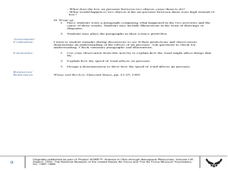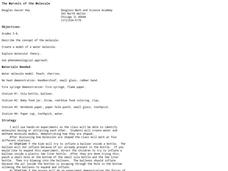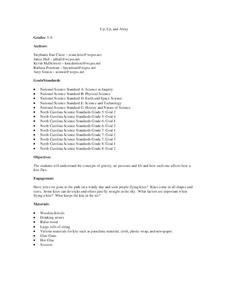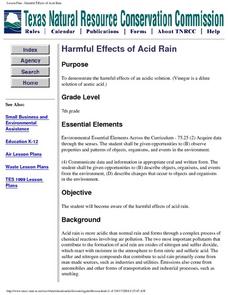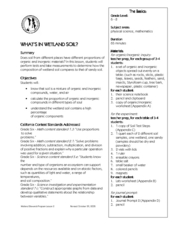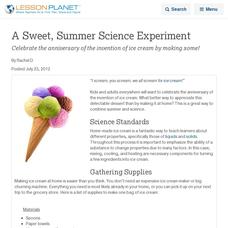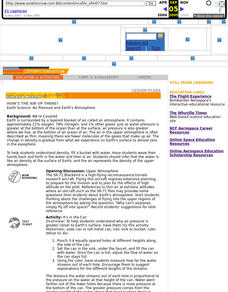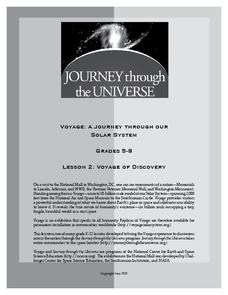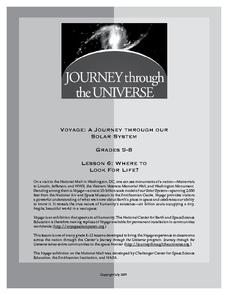Curated OER
How Do You Know There is Air in a Bag?
Fourth graders explore air as a material substance. Through experimentation and discussion, they explore how air can be classified as a material substance. Students write three examples proving that air is a material substance in their...
Curated OER
Have a Ball with Bernoulli II
Third graders explore the work of Daniel Bernoulli through experiment and background information. In this Bernoulli lesson plan, 3rd graders participate in air pressure experiments. Students record their observations of the effects of...
Curated OER
I Can't Take the Pressure!
Students explore the concept of air pressure. Using candy or cookie wafers to model how air pressure changes with altitude, they conduct an aluminum can crushing experiment, compare the magnitude to gravitational force per unit area,...
Curated OER
Gravity Gets You Down
Students design an experiment to investigate how objects with different masses fall. In this physics lesson, students predict how these objects will fall in a vacuum tube. They write a report explaining experimental results and conclusion.
Curated OER
Flight Dreams - The Pressure on Parachutes
Students investigate air pressure by researching parachutes. In this physics lesson plan, students participate in three separate experiments utilizing air pressure and paper products to test theories on parachutes. Students record the...
Curated OER
The Marvels of the Molecule
Students experiment with common substances to observe molecular behavior. In this molecular properties lesson, students move through four stations as they try to inflate a balloon inside a bottle, pour water from a jar, and observe how...
Curated OER
Falling Objects
High schoolers examine the velocities of two different falling objects. They produce distance vs. time and velocity vs. time graphs using a Motion Detector and a CBL 2 to collect experimental data. Learners analyze and interpret the...
Curated OER
Up, Up and Away
Tenth graders experiment with gravity and air pressure. In this geometry lesson, 10th graders build their own kits and fly it. They investigate the questions: what keeps a kite in the air and what are some important factors when flying a...
Curated OER
Weather
Students gain an understanding of air pressure. For this science lesson plan, students define weather, understand pressure, specifically air pressure, demonstrate the pushing power and other properties of air, and learn how a barometer...
Curated OER
Not So Neutral Views
Students explore ways to use indicators to distinguish between acids and bases. They conduct an experiment to model and discuss the harmful effect of acid rain in our living and non-living environment.
Curated OER
Inventors and Inventions 2:Air and Space
Students fly their own paper airplanes. In this flight lesson, students create paper airplanes and see whose plane will fly the farthest. They discuss what factors affect the flight and attempt to create a plane that will go farther.
Curated OER
Harmful Effects of Acid Rain
Seventh graders are able to demonstrate the harmful effects of an acidic solution. They become aware of the harmful effects of acid rain. Students make predictions before they began the experiment. If vingegar contains acid, then how...
Curated OER
What's in Wetland Soil?
Students examine the organic and inorganic components of soil. For this environmental science lesson, students identify the factors that influence soil formation. They collect soil samples, conduct tests, and analyze the results.
Curated OER
Experiment: Faster Air = Lower Air Pressure 2
Students experiment to observe air current and pressure.
Curated OER
Indoor Air Pollutant Sensing LAB: Peppermint Diffusion
Pupils engage in an experiment for the scientific concept of diffusion of particles. There are instructions for classroom set up prior to conduction of the activity. Students sit in the classroom that is filled with the smell of...
Curated OER
A Sweet, Summer Science Experiment
Celebrate the anniversary of the invention of ice cream by making some!
Curated OER
Forces and Motion
Students build parachutes for chicken eggs. In this physics lesson, students describe the forces acting on a falling object. They predict which of the three parachute models they made has the best chance of keeping the egg intact after a...
Curated OER
Math TODAY for TI-Navigator System - Humidity Makes Air Feel Even Hotter ? Part II
Learners explore quadratic and cubic functions that will model the relationship between air temperature and heat index at fixed relative humidity values. They also make generalizations and apply the findings using their TI-83 Plus or...
Curated OER
Applied Science - Science and Math Post-Lab
Students explore optical illusions. In this Applied Science lesson, students view optical illusions and record the data of what they see. Students graph the data that they collect.
Curated OER
How's the Air Up There?
Students experiment with soda cans and water to discover why air pressure is greater closer to Earth's surface.
Curated OER
Air Pollution Survey
Students identify the different sources of air pollution andevaluate knowledge of air pollution concepts in school and community. Students brainstorm ways of reducing air pollution and instruct school and community in reduction of air...
Journey Through the Universe
The Voyage Scale Model Solar System
Young scientists learn how to select a scale factor for a large scale model. Then they figure the scale for each of the planets and the distance between them. Finally, they construct a giant scale model of the solar system and answer...
Journey Through the Universe
Voyage of Discovery
Did you know that Pluto is smaller than the United States of America? It is difficult to conceptualize the size of planets and the distance between them, and the lesson addresses those exact issues. After a discussion, pupils create...
Journey Through the Universe
Where to Look For Life?
Every year we discover new planets including more than 1,000 in 2016 alone. Will we ever find life on another planet? The lesson includes two activities to help scholars understand this concept. First, they analyze the temperature range...



